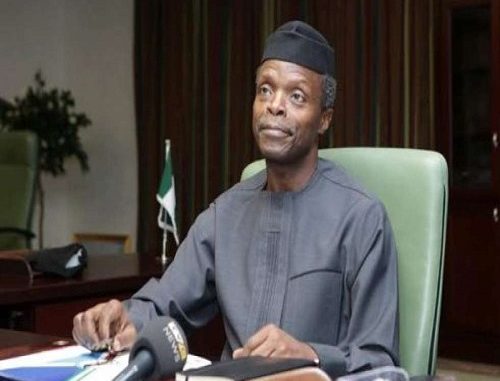
The Senate has said it will consult with its legal team for advice on the decision of the Acting President, Prof. Yemi Osinbajo, to withhold assent to four bills passed by the National Assembly.
The bills are Dangerous Drugs (Amendment) Bill 2016, National Lottery (Amendment) Bill 2016, Agricultural Credit Guarantee Scheme Fund (Amendment) Bill 2016, and the Currency Conversion (Freezing Orders) (Amendment) Bill 2016.
In the four letters sent to the Senate, dated February 7, 2017, the Acting President gave various reasons for his decision “Pursuant to Section 58(4) of the Constitution.”
On the Agricultural Credit Guarantee Scheme Fund (Amendment) Bill 2016, Osinbajo said, “The reasons for withholding assent to the bill are the concerns surrounding board composition, funding arrangements, limitation of liability of funds, and proposals to increase levels of un-collaterised loans from N5,000 to N250,000.”
For withholding asset to the Currency Conversion (Freezing Orders) (Amendment) Bill 2016, the Acting President said, “The rationale for withholding assent to the bill is the concern regarding modalities for the communication of asset forfeiture orders.”
Osinbajo also said the Dangerous Drugs (Amendment) Bill 2016 could not be assented to, saying, “The rationale for withholding assent to the bill are the concerns regarding certain words and phrases utilised in the draft bill that may be inconsistent with the Principal Act (for example, Section 6 of the bill with Section 21 of the Principal Act) and the spirit behind the proposed amendments.”
Also, the Acting President said he withheld assent to the National Lottery (Amendment) Bill 2016 due to “the existence of pending legal challenge to the competence of the National Assembly to legislate on the subject matter.”
After the Senate President, Dr. Bukola Saraki, read Osinbajo’s letters to senators at plenary on Wednesday, Senator Dino Melaye, who sponsored the National Lottery (Amendment) Bill, raised a point of order and dismissed the Acting President’s reason for not assenting to it.
Citing Section 4 of the constitution, the senator described the court process and the decision by Osinbajo as against the principle of separation of powers.
Melaye said, “Mr. President, the explanation for withholding the assent as stipulated in the letter by the Acting President is because there is a pending litigation on this matter. Mr. President, democracy is standing on the basic principles of separation of powers and it has divided this into three; the executive, the legislature and the judiciary.
“Mr. President, the role of the executive is to carry out its fundamental objective by signing anything that has been passed by this House and anyone who has a problem with it can go to court in compliance with the provisions of Section 6 of the constitution. May it not be a bad day for democracy if we keep quiet and allow the powers of the legislature to be usurped by the non-compliance to the provisions of the constitution.”
Saraki, in his response, said the chamber would seek legal advice on the matter as it had to do with separation of powers.
He said, “I think the procedure is that we will refer this (issue) to our legal department to give us advice on interpretation on some of the things that you have said, for us to be properly guided. But, I agree with you that it is a matter that we must take seriously because it goes down to the issue of separation of powers. We would get the opinion of the legal department.”
But Senator George Sekibo, rose up to say that the National Assembly had the powers to override the veto of the President.
He said, “The way the constitution is framed, they have their own roles to play and we have our own role to play. We check each other. I know that the matter is in court and based on our rules, we cannot discuss it; it is a different thing. But if it is just that the President did not give assent, we have to look at the merit of the particular bill if it meets the standards and if the court matter is not going to impede what we are going to do. Then, we can override the veto of the President.”
Again, Saraki stated that the issue should be referred to the legal department for interpretation and counsel.
Source – The Punch